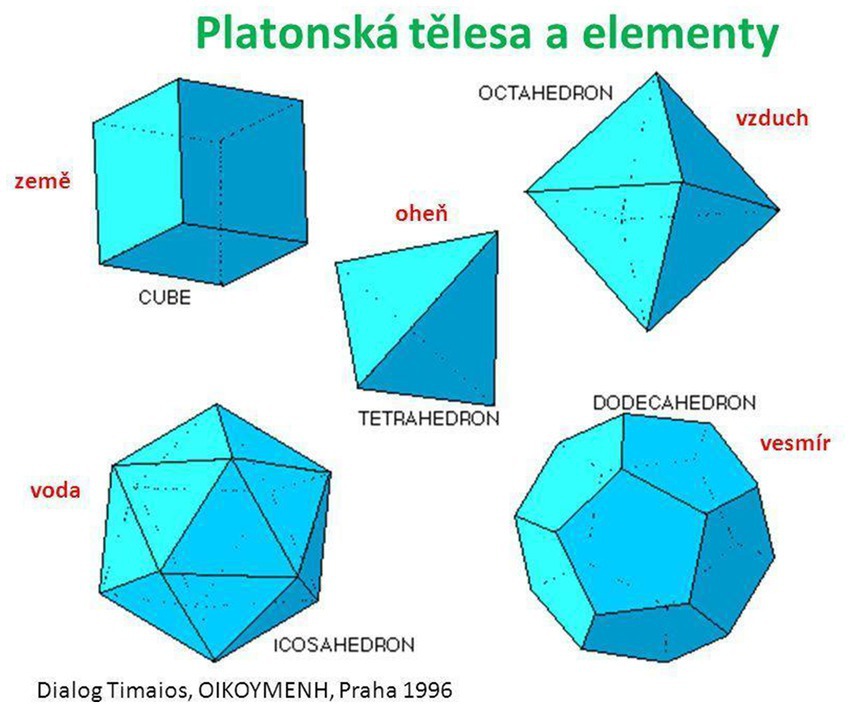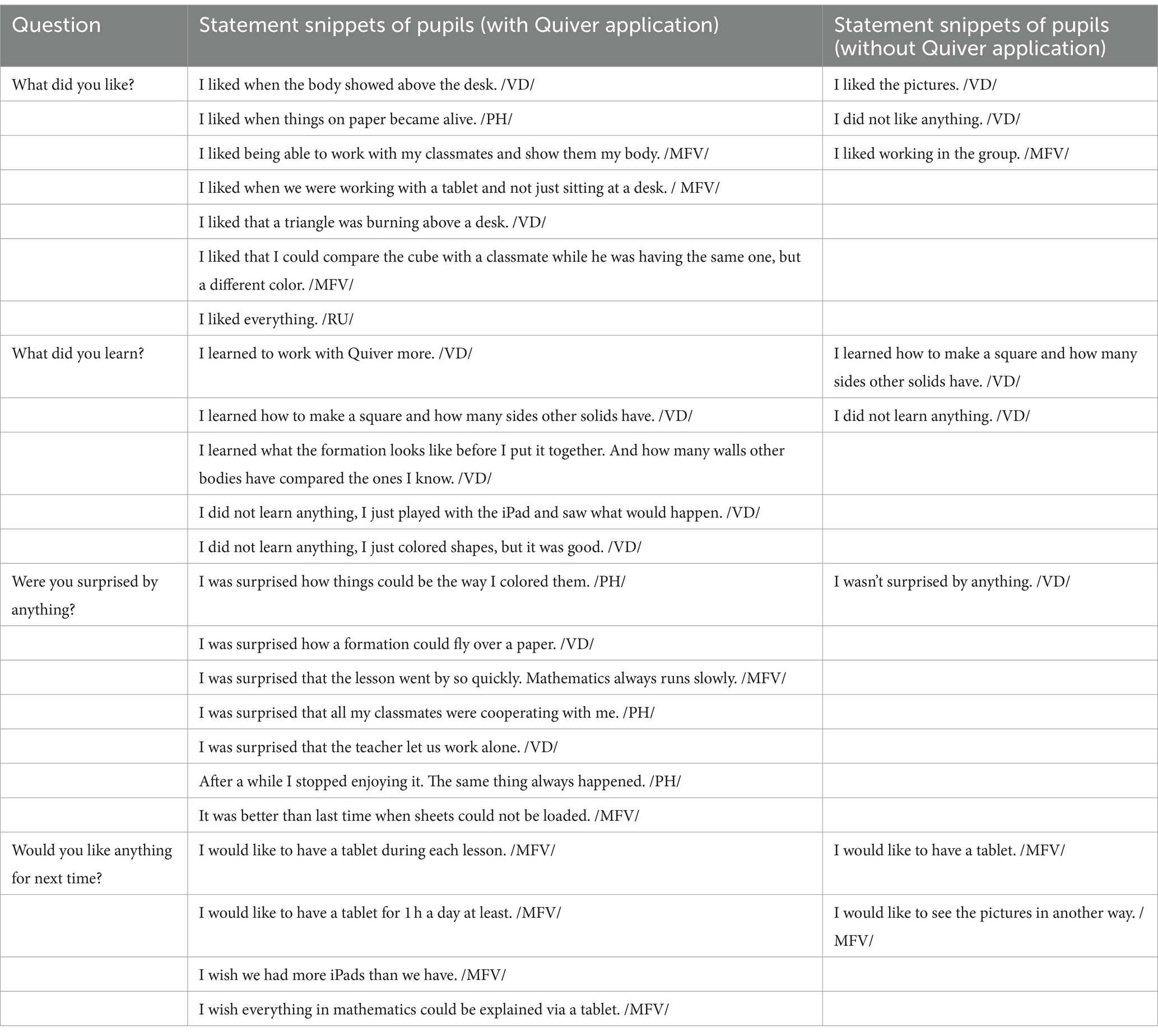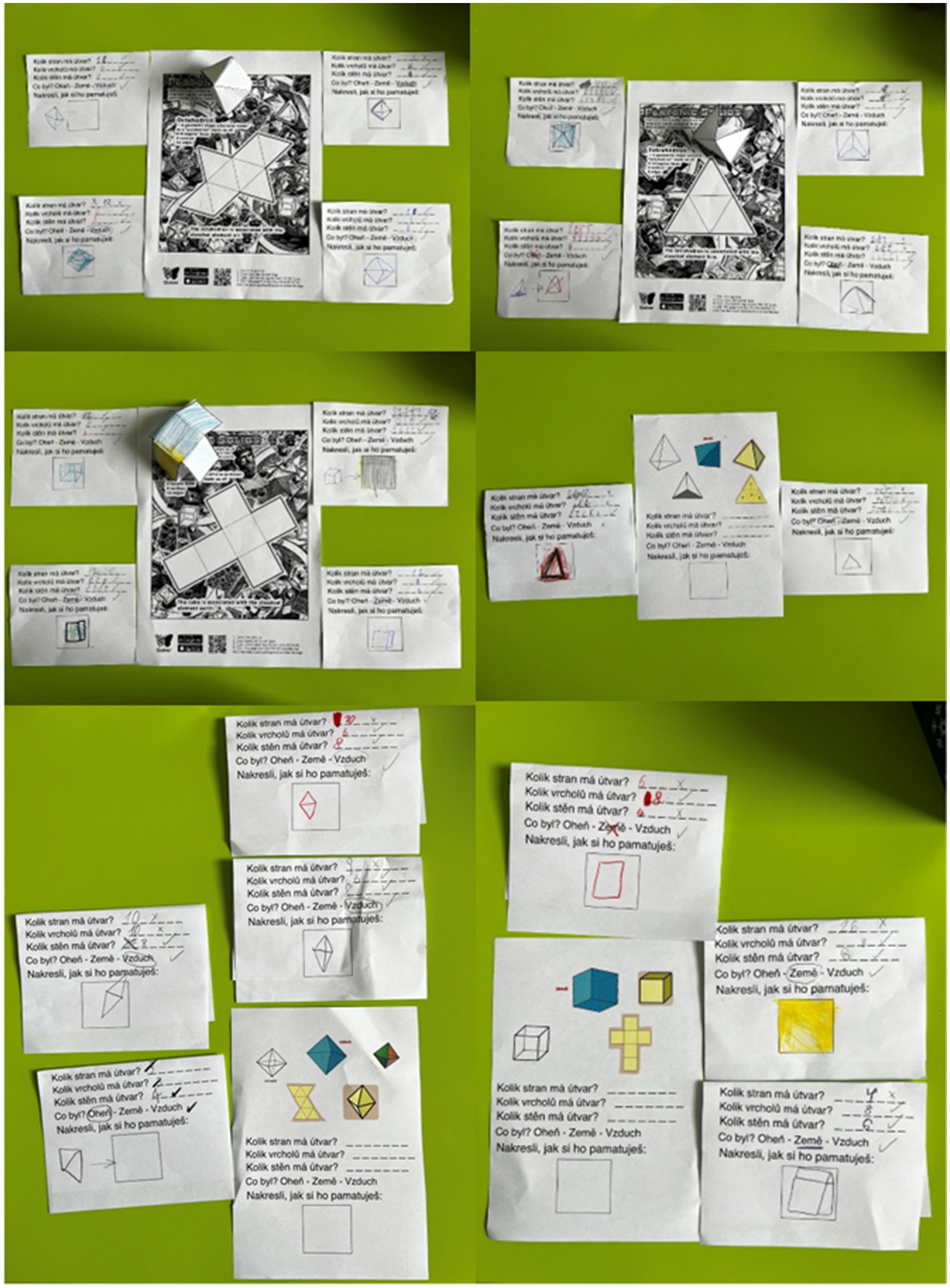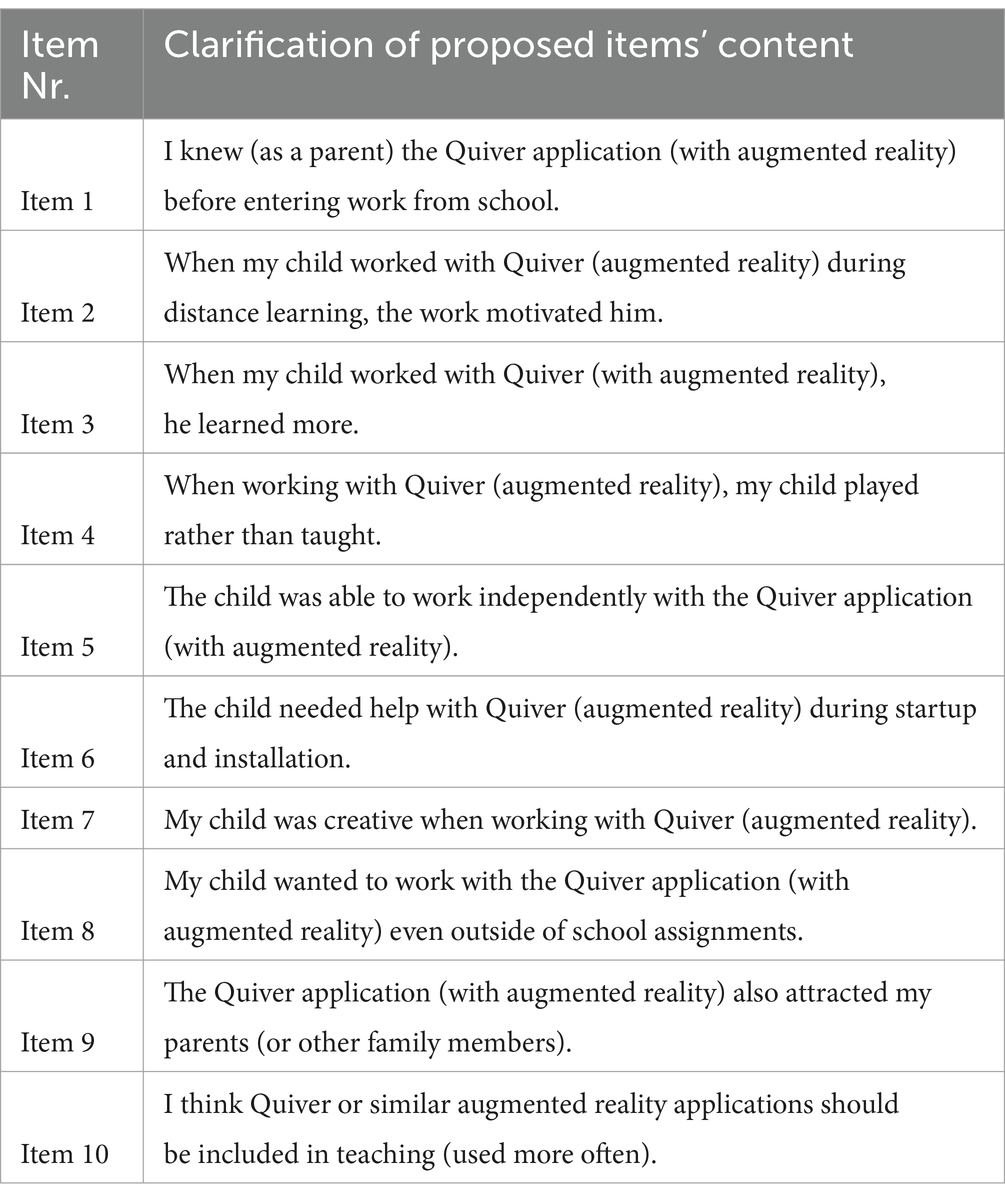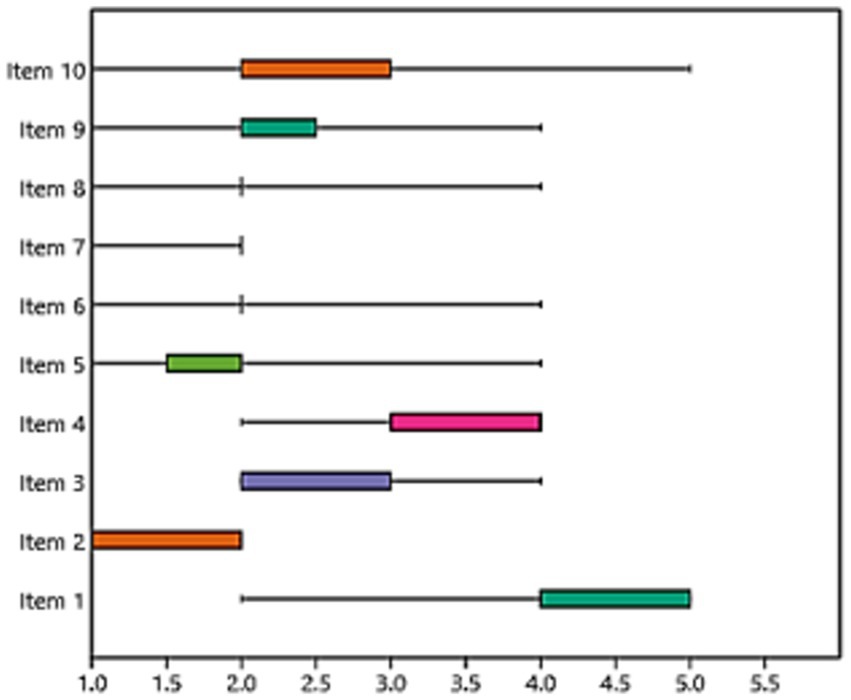- 1Faculty of Education, University of Ostrava, Ostrava, Czechia
- 2Faculty of Education, Comenius University Bratislava, Bratislava, Slovakia
- 3Department for STEM Didactics, Johannes Kepler University Linz, Linz, Austria
Currently, there is a need to develop digital competencies already because they are included in the new curriculum. This article explores the field of augmented reality (AR) and its educational potential to bolster digital literacy in primary education. The core objective is to scrutinize the suitable use of AR-integrated mobile applications in primary schooling, spotlighting widely adopted apps and their practical applications. The article underscores digital literacy as a key competence for children’s self-directed future learning. In our research we used a combination of qualitative and quantitative research approaches. It seeks to identify the impacts and benefits of AR in primary school settings. In a natural didactic context, it is conducted as action research. The methodology includes direct observation of pupils engaging with the AR app Quiver during educational tasks, complemented by discussions with their teacher as a focus group. Additionally, the study gathers insights from parents via questionnaires based on their perceptions of AR in education. The analysis of the interview data utilizes the open coding technique to interpret the findings. The relevance of the research was confirmed by the consistency of results when transitioning from onsite to online learning environments. The study showed that AR engagement helped to increase the digital literacy of the participating pupils, showing high levels of engagement, motivation and collaborative communication.
1 Introduction
In today’s dynamic educational sphere, ICT technologies are not just present but pivotal in shaping the everyday learning journey of young minds in pre-primary and primary school settings (Sujansky and Ferri-Reed, 2009). These cutting-edge technological strides open a treasure trove of possibilities for educators, revolutionizing traditional teaching methodologies. Amidst an evolving educational world, there’s a critical and growing demand for STEAM (Science, Technology, Engineering, Art and Mathematics) education at all levels, fueled by the burgeoning market need for skilled professionals in these sectors (Berger-Haladová and Ferko, 2019). This article takes a dive into how we can make STEAM irresistible to the tech-savvy Generation Z and Alpha, starting right from their first ABCs. It’s about reimagining education through innovative, engaging, and downright captivating methods. And at the forefront of this educational renaissance Augmented Reality (AR). This article explores if AR is truly not just a technological trend, but a kind of game-changer in the realm of education, promising to transform how we teach, learn, and inspire the innovators of tomorrow.
We were interested in how students would respond to using the Quiver app in math lessons given that students often struggle with imagination.
2 Digital competence
Nowadays, it is desirable to develop digital competences in pupils as early as the 1st grade of elementary schools, which is also confirmed by the inclusion of these competences in the framework educational program. We believe that using AR apps develops these competencies. Many authors have defined the concept of competence. According to Chvála and Strakova (2014), one of the possible definitions is the designation of competence as the application of what we know and can do as a task or problem in everyday life. Key competencies are competences that represent the sum of knowledge, skills, and abilities important for the student’s personal development and their application in society.
Different teaching methods can be used to develop pupils’ IT thinking. Through the use of ICT –mediated instruction students can develop higher-order thinking skills. Critical thinking is an intellectual process that questions information and examines facts. Barak and Dori (2009) also pointed out that critical thinking is a skill that requires the ability to think independently, clearly, reflectively, logically and rationally in an effort to take responsibility and to control one’s own mind. Categorization and classification is one of the higher-order skills which can be developed through the use of ICT—mediated instruction. Methods that can be applied to pupils in the primary school with the aim to achieve more effective learning, a deeper and more permanent knowledge of the issue and to motivate pupils to learn and think are active learning through pupil’s own activity, discussions, solutions problems, critical thinking, E-U-R, group teaching, evaluation, learning in the form of a game and more. E-U-R is one of the teaching planning methods that is built on a constructivist approach to learning. Sometimes this model is also called the three-phase model of learning. It contains the initial letters of these words: evocation, awareness of the meaning of information and reflection (Novotný et al., 2001).
For pupils in primary school, it is appropriate to rely on their experiences when learning, and thus develop their IT concepts through their own activity and provide them with a better grasp and mastery of the given topics. At the method of solving problems based on trial and error, students try to come up with different solutions; a mistake is perceived here positively and naturally, when pupils learn through it. The basis of IT thinking should be the active work of the pupil, when creative thinking, self-confidence, joy, and success in learning. The discussion method supports the pupils’ communication skills and self-confidence, pupils can react to each other and learn to formulate their opinions and arguments (Institute of Medicine and National Research Council, 2015).
3 Augmented reality
As previously mentioned, this paper delves into the innovative use of Augmented Reality (AR) in primary education, a crucial STEAM area, with a specific focus on its perception by future primary teachers. It is also called immersive technology.
AR technology revolutionizes students’ or pupils’ access to educational content, transcending geographical and temporal barriers to create a flexible, mobile learning environment (Ganguly, 2010). This approach can be aligned with the constructivist theory of learning, which posits that knowledge is actively constructed through personal experiences and interactions within a socio-cultural context (Tóthová et al., 2017; McDowall, 2016). Each tool can be used for different teaching methods from classical to constructivist teaching. The body of research explores various theories and practical applications of AR in education, presenting a spectrum of solutions and analyses (e.g., Azuma, 1997).
The visual impact of AR is particularly significant for young learners, where motivation plays a pivotal role (Berger-Haladová and Ferko, 2019). For example, AR can transform the teaching of complex subjects like geometry into an engaging experience, as demonstrated by apps such as Quiver 3D Augmented Reality coloring apps (where colored images come to life in the learning space). The visual and interactive elements of AR can help children remember information better and understand subjects more easily. AR can foster creative thinking and innovation by providing space for pupils to experiment, create and explore new possibilities. The use of AR can motivate students to learn and enhance their participation and engagement during lessons (Prodromou, 2020).
The positive impacts of AR in educational settings are well-supported in literature. AR allows the coexistence of virtual objects and real environments, enabling learners to comprehend complex spatial relationships and abstract concepts at the same time (Arvanitis et al., 2007). Radu (2014) emphasizes AR’s benefits in enhancing students’ understanding, memory retention, collaboration, and motivation.
When integrated into educational environments, AR applications can:
• Engage students in authentic explorations in the real world.
• Facilitate the observation of phenomena that are otherwise challenging to perceive with the naked eye, by juxtaposing virtual elements with real objects.
• Boost student motivation and foster the development of advanced investigative skills.
• Create immersive hybrid learning environments, blending digital and physical elements, which are instrumental in developing comprehensive processing skills (Niraj, 2023).
The article was created during the time of COVID when students were at home. At this time, they needed a more tangible understanding of what they were learning. That’s why we used AR applications. Here is a brief overview of the most popular AR applications, which helped us to choose the most suitable application for our research. We assessed the suitability of mobile applications integrated with augmented reality in primary education and their practical use (Korenova et al., 2019).
• Quiver: This app merges traditional coloring with advanced AR technology. Featuring the Platonic Solids. It enables students to visualize three-dimensional shapes, enhancing their understanding of geometry in a fun, interactive way. Beyond mathematics, Quiver’s diverse printable worksheets make it suitable also for teaching natural sciences under the STEAM concept.
• Quiver Education: Tailored for pre-primary and lower primary education, this coloring app includes a variety of educational materials such as descriptions of erupting volcanoes, world capitals, and cellular structures.
• Halo AR: This application brings books to life. After reading, students use Halo AR to uncover questions and tasks hidden on the book cover, fostering independence and motivation through interactive learning.
• Catchy: This app creates a secret letter puzzle in the classroom. Students gather letters during the class and assemble them to solve the puzzle. It is suitable for example for language lessons (both Czech and English).
• AR Makr: Teachers can create spatial stories or fairy tales, which pupils can then for example narrate or demonstrate to their classmates, enhancing storytelling skills.
• AR Flashcards Shapes and Addition: The AR Flashcards are available at no cost, featuring Shapes and Addition as premium, paid modules. Despite their associated fee, the value derived from these modules makes them a worthy investment. This suite of applications is specifically designed to foster the development of basic mathematical skills in children. The Addition module employs captivating animal imagery to effectively illustrate the concept of counting, spanning equations from 0 + 1 to 9 + 9. The Shapes module, on the other hand, allows students to interactively color various geometric figures, while simultaneously learning their names, colors, and forms in English. Importantly, it also offers insights into the real-world applications and occurrences of these shapes. Overall, this application serves as a suitable resource for mathematics education.
• Augmented Polyhedrons—Mirage: This app aids in teaching mathematics by allowing students to compare three-dimensional shapes side-by-side.
• ARuler: A practical tool for measuring real-world objects in various units, enhancing the learning experience in mathematics and science.
In the realm of natural science, AR apps bring abstract concepts to life, such as human anatomy and the universe:
• Night Sky: Ideal for teaching about constellations, allowing students to view real constellations in their actual positions.
• Spacecraft 3D: This app has been developed in collaboration with NASA, this app showcases various space technologies, enriching lessons about Mars, Earth, and the universe.
Additional applications suitable for both pre-primary and primary education stimulate imagination and aid in various subjects:
• AR Flashcards: The application proves to be a useful tool for post-printing online, e.g., online worksheets, facilitating the practice and reinforcement of English animal vocabulary as well as the English alphabet.
• Aurasma (HP Reveal): This innovative app enables students to create images or videos with ease. Educators can embed assignments within the classroom by uploading specific content, or by directing the camera at a title, students can associate it with, e.g., an image. Aurasma is versatile and can be integrated across various subjects.It also encourages creativity by allowing students to create pictures or videos, with tasks hidden in the classroom.
• AR Dragon: Designed for children, including also those in pre-primary education, AR Dragon is an engaging application that simulates pet care. Through interactive play, it nurtures a sense of responsibility and fosters the development of social competencies.
• Sketch AR: This is an AI based mobile app allowing anyone to draw. Theory and practice are effectively combined into fun experiences.
• Animal 4D+: With Animal 4D+, students can marvel at three-dimensional animals projected right onto their desks. The application not only visualizes the animals but also includes sounds, providing a multi-sensory experience of wildlife that students may have never encountered.
• Catchy: Catchy reveals a hidden puzzle comprised of letters that students collect and arrange to solve. This interactive learning tool is useful for both Czech and English language instruction.
• AR Makr: AR Makr empowers educators to create spatial narratives or fairy tales. Subsequently, students can narrate or visually share these stories with their peers, enhancing both storytelling and presentation skills.
4 Materials and methods
4.1 Research design
The objective of this article is to investigate the dynamics between augmented reality (AR) and children within the context of primary education, both online and in face-to-face classroom settings.
4.1.1 Applications suitable for primary school level
In the academic year 2019/2020, a series of AR applications were tested in primary education, both in school and in online learning. This exploration led to the identification of several AR apps suited to primary school settings.
After reviewing the available AR applications suitable for 1st grade of elementary school that meet STEAM requirements, we decided to include the Quiver application for teaching Platonic solids. This application covers the topic of Platonic solids very comprehensively and it is visually appealing to pupils (RVP, 2016).
4.1.2 Research sample: third-grade pupils and their parents
Pupils worked with the Quiver application both in groups during face-to-face class and individually during online sessions due to the COVID pandemic. Initially, they were unaware of the specific learning outcomes anticipated from the application. Provided with paper printouts of Platonic solids (online learners viewed these on their screens), they collaboratively discerned the nature of the bodies and their constituent geometries. Pupils working online independently, similarly deduced the represented element. The application was then utilized for approximately 20 min, with each group exploring a distinct worksheet, discussing, and interpreting the information related to Platonic bodies. Subsequently, groups prepared presentations of their observations. A comparative analysis followed, wherein pupils deliberated over the similarities and discrepancies of their findings, deepening their comprehension of the facets and configurations of the solids.
4.1.3 Research questions
How did the pupils react to the first use of the Quiver application on the topic of Platonic solids?
What were the initial impressions of parents regarding the use of the Quiver application in their child’s education on Platonic solids?
4.1.3.1 Hypothesis (qualitative research)
According to pupils and parental feedback, the Quiver application boosts pupils’ interest in discovering properties of Platonic solids.
4.1.3.2 Hypothesis (quantitative research)
The Quiver application helps pupils discover the properties of Platonic solids and visualize them in 2D.
4.1.3.3 Methodological approach
This study adopts a mixed-methods approach, employing both qualitative and quantitative research techniques.
Qualitative Research: Standard Focus groups consisting of 6–8 randomly selected children the scope of the teaching unit was up to 2 h. The teacher then leads a discussion, asking the children questions. Focus groups were conducted to capture in-depth insights during both online and face-to-face sessions. We utilized the Quiver application as part of a novel Mathematics curriculum. We observed the pupils’ reactions on the use of Quiver application while learning about Platonic solids. These observations were then cross-compared for a comprehensive understanding (Švaříček and Šedová, 2007).
Quantitative Research: A structured questionnaire was administered to gauge the perceptions of parents towards the usage of Quiver application during online learning. At the beginning of the lesson on Platonic solids, the pupils were divided into two groups. During the introduction to Platonic solids and the exploration of their properties, the first group used the Quiver application, while the second group had only educational cards (link). Afterwards, the pupils were tasked with completing a worksheet (without using the Quiver application or the cards) based on the knowledge they had gained during the preparation time.
The class was divided into 2 parts. One group had the Quiver app and a worksheet, the other group had just a printed image. The pupils were also divided into study groups of three. Each group had a different Platonic solid.
The qualitative phase involved focus groups coupled with observation.
The quantitative phase involved questionnaires for parents who assisted their children with the Quiver application throughout the online educational process.
For practical implementation, the focus group was integrated into an action research framework with students. After the final analysis of the options/benefits listed in the overview, we chose the Quiver application. This method was expected to promote openness and facilitate the sharing of views.
The characteristics of quality action research were defined as follows:
• Pupils reflect and improve practice in their natural environment.
• The experience gained is shared with the participants, but also with everyone else.
• Data are collected by the research participants themselves and their questions are addressed.
• Cooperation of all participants in all phases of research.
• Differences in the status of individual participants are put aside.
• Cooperation between all participants works and the community can critically evaluate the situation.
• Children are ready for self-reflection, self-evaluation and self-management, there is effective (and collaborative) learning through mistakes.
• The idea that everyone is their own best teacher is encouraged (Zuber-Skerrit and Fletcher, 2007, p. 415).
5 Results
5.1 Execution of research
The research was conducted at the Elementary School and Kindergarten in Ludgeřovice, where I have been teaching pupils aged 7 to 12 for 6 years. Our pedagogical approach primarily utilizes technology to reinforce existing curriculum frameworks and to stimulate pupil engagement and motivation while booting new curriculum. The school is equipped with 120 iPads, as well as Dash and Dot robots, Ozobots, Lego Mindstorms, Beebots, and Micro:bits, all of which are integrated into classroom activities as per the teachers’ discretion. There is also a classroom equipped with iPads and robots which we use mainly for more digitally advanced work or for more sophisticated projects involving these devices and robots.
From kindergarten through to the lower primary education (1st and 2nd grades), we commence programming activities with Bee-bots called “robotic bees,” which boast an intuitive and straightforward design. Progressing to the 3rd and 4th grades, pupils advance to programming Ozobots, which can be controlled via color-coded commands or through a programming language on a PC or iPad. In the 3rd grade, we introduced the simpler applications of Dash and Dot robots, progressing to more complex code-building in the programming language with older pupils in the 4th and 5th grades. iPads are employed from the first grade onwards, with each classroom providing a one-to-one ratio of devices to pupils.
This school’s technological provision is exceptional; the majority of schools in the Czech Republic do not possess such resources, nor are the teachers typically trained to utilize them effectively. Nonetheless, the Ministry of Education has mandated the inclusion of these competencies in the educational curriculum, necessitating that schools adapt to these requisites within 2 years.
During the academic year 2021–2022, our study was carried out among third-grade pupils at this elementary school, both in face-to-face and online sessions necessitated by the COVID-19 pandemic. There were 26 pupils in the first class and 24 pupils in the second class. The pupils were already acquainted with iPads and could control them pretty well. Our research entailed observing pupils’ behavior while using the Quiver application, particularly as they engaged with a new curriculum segment on solids.
The application proved instrumental in enabling pupils to visualize mathematical concepts and other abstract notions. In conclusion, two reflective questions were posed by the educator (Figure 1):
What knowledge did you acquire that was new to you?
Did you find this educational activity enjoyable?
5.2 Qualitative method: observation
The objective of the unstructured observation (without a pre-prepared scheme) was to record the pedagogical process wherein the educator deliberately facilitated the social constructivist approach to fostering the child’s intrinsic motivation via augmented reality (AR). The observations were audio-recorded and subsequently transcribed for analysis. Through the implementation of qualitative research via observation, we garnered the following insights.
5.3 Focus group elaboration
The focus group was employed as a primary method for data collection. Defined as a collective discussion format, the focus group facilitates dynamic interaction among participants, in this case, enabling students to articulate their opinions and elucidate their perspectives freely. The primary methodological approach of qualitative research was unstructured observation, where the observer’s interaction with the participants was minimized to avoid influencing their natural behavior. This observational stance allowed for the assessment of cooperation, creativity, motivation, digital literacy, and independent learning as mediated through augmented reality. Observations were categorized as either direct, which involved monitoring the communication between students, or indirect, capturing authentic interactions within the educational process.
5.4 Research implementation
For practical implementation, the focus group was integrated into an action research framework with students. This method was anticipated to foster openness and facilitate the sharing of views. The teacher’s role was to guide the discussion, pose questions, and encourage participation. Initially, pupils were prompted to respond to a set of questions (“What did you like most when we were using augmented reality apps on iPads?” “Could the application help you visualize shapes that you only had seen on paper before?” “Did you learn something new?” “What did not you like?” “Would you like to use this application in other lessons as well?” “What was the work like in groups”) designed to elicit their experiences with augmented reality applications on iPads.
A digital dictaphone recorded the discussions. The responses offered insights into the pupils’ engagement with the augmented reality application. These recordings were subsequently transcribed, and open coding was applied to the transcript to establish thematic categories (Table 1).
The pupils worked both individually and collaboratively within their groups, contributing to a shared objective while also pursuing their personal learning goals (Figure 2). The group dynamic was characterized by mutual respect and shared experiences. Unbeknownst to the students, their interaction with the images contributed to their learning process (Figure 3). Both direct and indirect observations were documented in a written Table (see Table 1).
Indirect observation sought to identify the presence and frequency of specific phenomena within various contexts.
Analysis of the pupils’ discourse during the focus group sessions involved an inclusive approach to discern the optimal use of augmented reality within educational practices. The open coding process facilitated the exploration, comparison, categorization, coding, and conceptualizing of the data collected.
The principal concepts articulated within individual statements were extracted and systematically categorized within the statement protocol (Table 2).
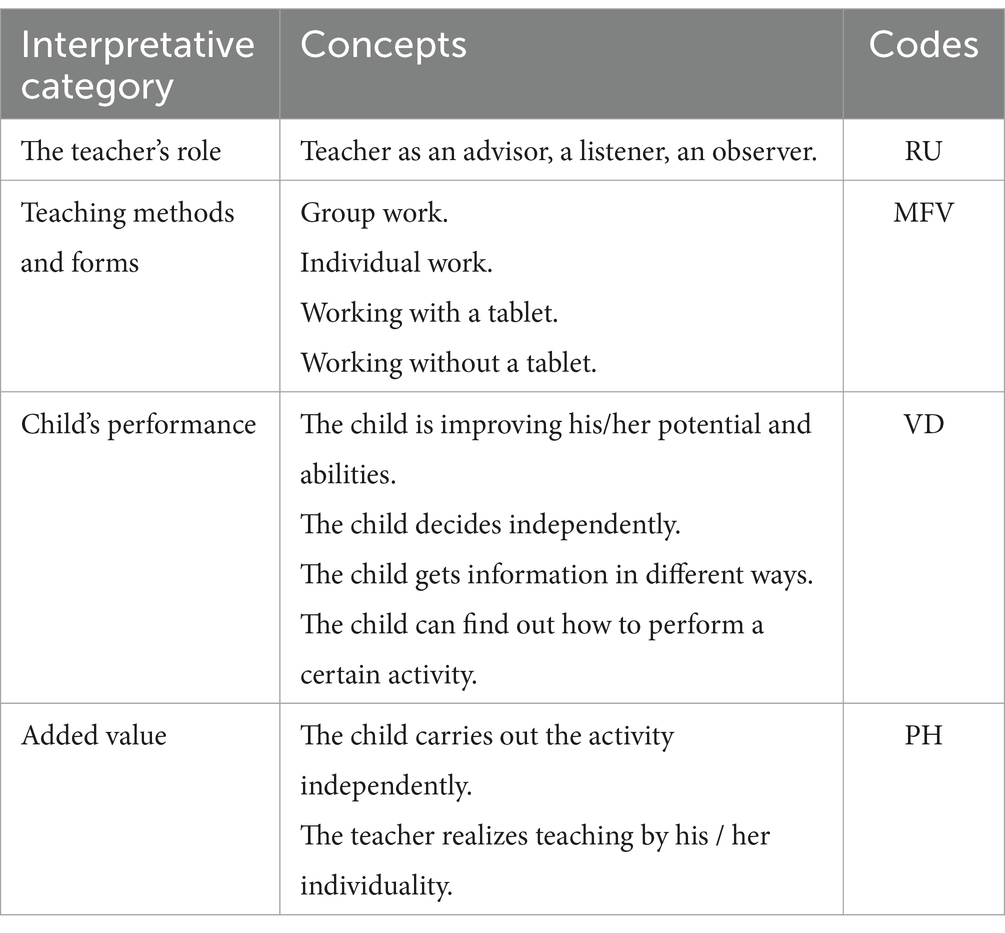
Table 2. List of identified categories, concepts, and codes in Table 1.
5.5 Quantitative method
5.5.1 Research questions
What impact does the Quiver application have on pupils’ during online education?
How do parents perceive the Quiver application within the context of their children’s learning?
Can Augmented Reality (AR) enhance motivation, knowledge, creativity, and collaborative skills among children?
Our investigation sought to discern parents’ perceptions and attitudes towards the utilization of AR in online education. The pupils were familiar with the Quiver application from school and extended its use to home settings via smartphones or tablets. The study aimed to substantiate or disprove the hypothesis: Parents believe that the Quiver application fosters student motivation and contributes to increased knowledge and creativity.
5.6 Statistical analysis of research focus areas
The statistical analyses targeted the issues related to the use of Quiver, employing descriptive statistics and analysis of interdependencies among identified variables. Methodological rigor was ensured by adhering to standards of statistical significance as delineated in contemporary research (Gauthier and Hawley, 2015; Kitchenham et al., 2017; Barot and Krpec, 2019). Key variables and statistical outcomes are delineated in the following table, with abbreviations clarified for ease of reference:
Table 3 presents the descriptive statistical parameters corresponding to the Likert scale responses provided by the participants. This scale was composed of statements to which the respondent can answer on a scale representing the degree of agreement. There were offers on a scale of I completely agree, I agree, I have no strong opinion, I disagree, I do not agree at all. The number of possible answers, their specific naming, or the inclusion or exclusion of the median value may vary according to the specific application. The Likert scale makes it possible to determine not only the content of the attitude, but also its approximate strength.
Additionally, Figure 4 offers a graphical representation of these outcomes in the form of a boxplot for visual interpretation of the data distribution (Table 4).
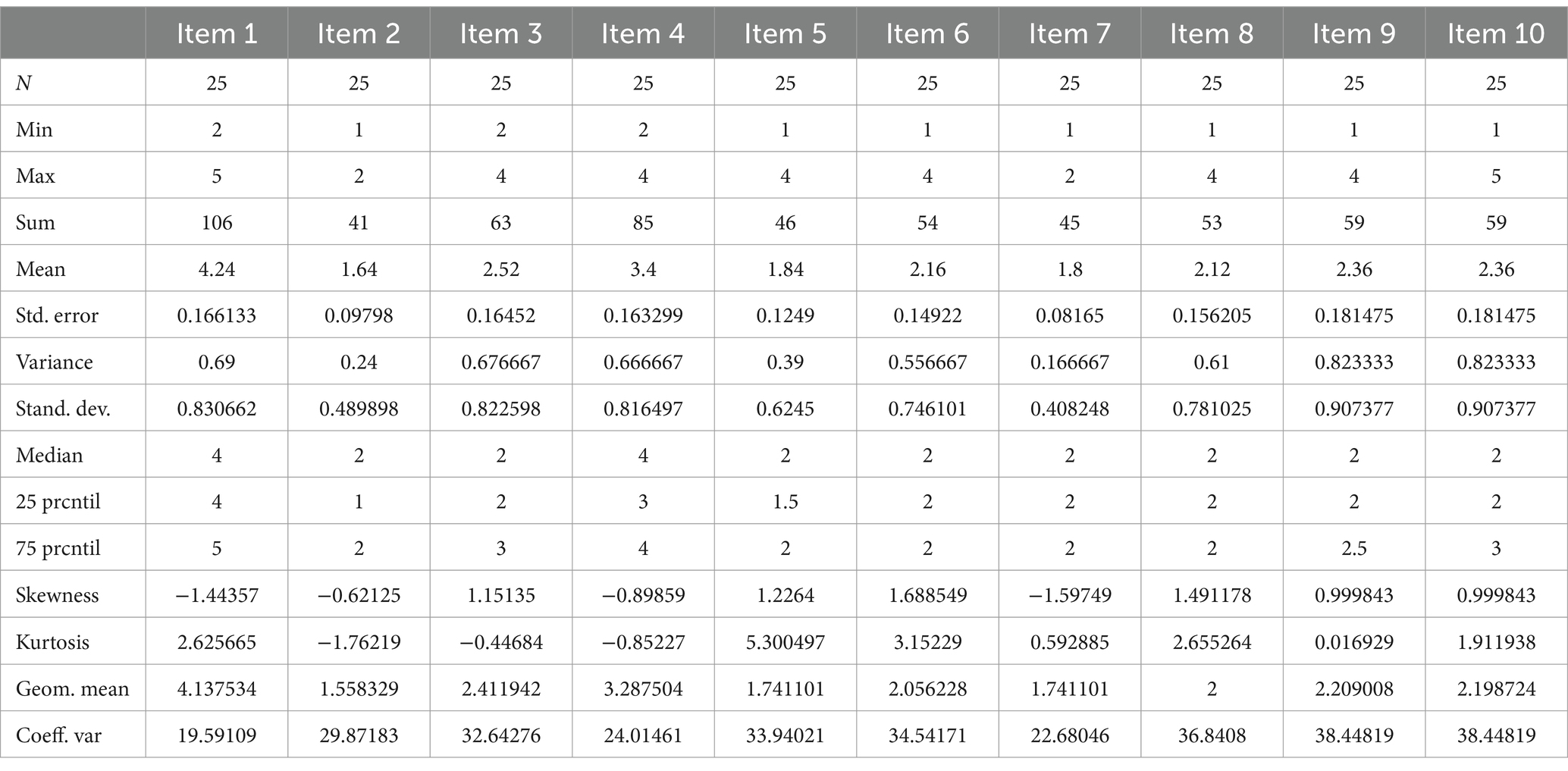
Table 4. Obtained descriptive statistics for proposed research items according to analysis of quiver impact.
The analysis of the interactions among the variables under study reveals correlational relationships, which are depicted in Figure 5.
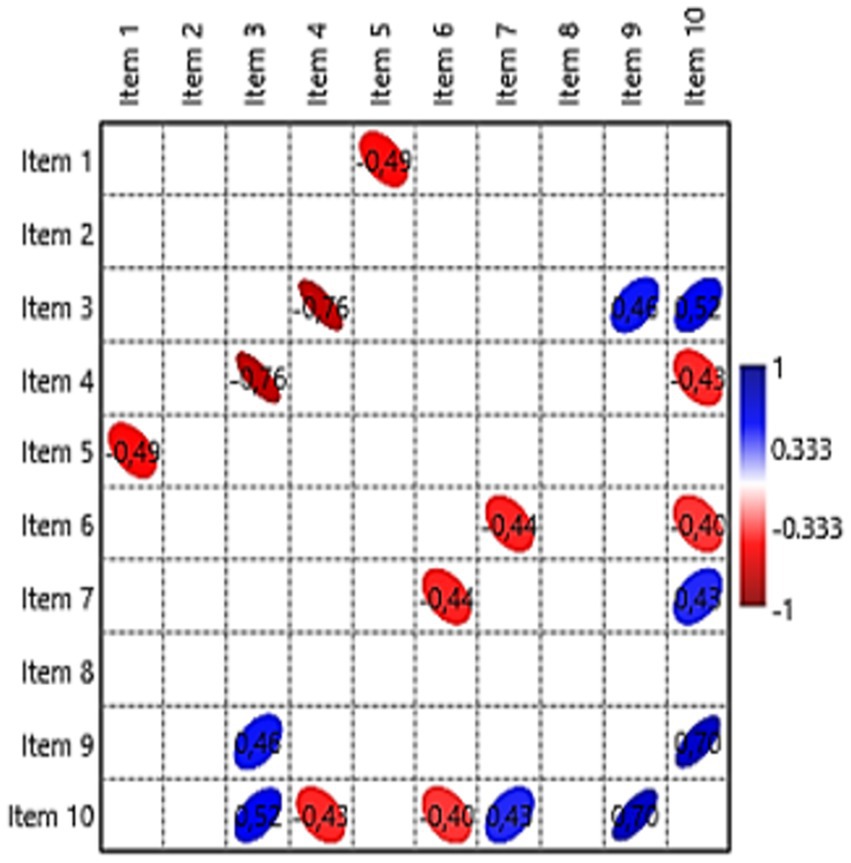
Figure 5. Visual form of presentation of interaction between items as correlations of given scale of intensity.
In this study, we further investigate the observed interactions among specified variables. For sets comprising both dependent and independent variables of a cardinal nature, multiple regression analysis is deemed an appropriate method to examine the interrelations among the variables in question. A significance level of 0.05 has been adopted. The application of mathematical induction methods, utilizing p-values, facilitates the verification of the correlations among specific outcomes.
5.6.1 Situation 1—considered variables: Item 1 + Item 9 + Item 10
This scenario examines whether prior familiarity with the Quiver platform influenced parental attitudes towards its subsequent integration into educational practices. The variables analyzed were:
Item 1: Familiarity with the Quiver application before it was introduced in the school setting.
Item 9: The extent to which parents found the Quiver application engaging.
Item 10: Parents’ opinions on whether the Quiver application should be more frequently integrated into the curriculum.
The statistical analysis involved multiple regression to understand the relationship between these variables (Table 5).
The constant value of 4.4033 indicates a high baseline level of support for integrating the Quiver application into educational practices, regardless of prior familiarity. The coefficients for Items 9 and 10 were relatively small and not statistically significant, as indicated by the high p-values (0.62774 and 0.46147, respectively). This suggests that neither the engagement level (Item 9) nor the belief that Quiver should be more integrated into the curriculum (Item 10) were significantly influenced by prior familiarity with the platform.
Analysis: The R2 value is very low (7.82E-05 for Item 9 and 0.014258 for Item 10), indicating that the model explains very little of the variance in parental attitudes based on the variables considered. This low explanatory power suggests that other factors not included in this model may play a more significant role in shaping parental attitudes towards the Quiver application. The t-values are low (0.49179 and −0.74954), further supporting the lack of significant relationships. The p-values are much higher than the common significance threshold of 0.05, reinforcing the conclusion that there are no statistically significant interactions among the observed variables.
Interim Conclusion: The analysis did not reveal any statistically significant interactions among the variables considered (prior familiarity, engagement, and opinion on integration). This suggests that parents’ support for the Quiver application in educational practices is not strongly influenced by their previous familiarity with the platform. Other factors, potentially including direct observation of their children’s engagement and learning outcomes, may be more critical in shaping their attitudes.
Future research should explore additional variables that could influence parental attitudes, such as direct feedback from their children, observed improvements in academic performance, or the perceived ease of use and technical reliability of the application. This broader approach may provide a more comprehensive understanding of the factors driving parental support for AR technologies in education.
5.6.2 Situation 2—observed aspects: Item 2 + Item 3 + Item 8
This scenario examines whether the Quiver application proved to be a motivator for children, potentially increasing their learning engagement and willingness to extend educational activities beyond formal schoolwork. The variables analyzed were:
Item 2: The degree to which the Quiver application motivated children during distance learning.
Item 3: The extent to which children learned more while using the Quiver application.
Item 8: The willingness of children to use the Quiver application outside of assigned schoolwork.
The statistical analysis involved multiple regression to understand the relationship between these variables (Table 6).
The constant value of 2.0804 suggests a moderate baseline level of motivation among children to use the Quiver application. The coefficients for Items 3 and 8 were negative and not statistically significant, as indicated by the high p-values (0.5761 and 0.35107, respectively). This suggests that neither the amount learned (Item 3) nor the willingness to use Quiver outside of schoolwork (Item 8) were significantly related to the motivation level measured in Item 2.
Analysis: The R2 values are very low (1.86E-02 for Item 3 and 0.043716 for Item 8), indicating that the model explains very little of the variance in children’s motivation based on the variables considered. This low explanatory power suggests that other factors not included in this model may play a more significant role in influencing children’s motivation to use the Quiver application. The t-values are low (−0.56753 and −0.95275), further supporting the lack of significant relationships. The p-values are much higher than the common significance threshold of 0.05, reinforcing the conclusion that there are no statistically significant interactions among the observed variables. The negative coefficients for Items 3 and 8 indicate that there is no positive relationship between these variables and the motivation level. However, given the lack of statistical significance, these relationships are not meaningful.
Interim Conclusion: The data did not reveal any statistically significant interactions among the variables considered (motivation during distance learning, increased learning, and willingness to use the application outside of schoolwork). This suggests that children’s motivation to use the Quiver application is not strongly influenced by the amount they learn or their willingness to use it outside formal school assignments.
Future research should explore additional variables that could influence children’s motivation, such as the novelty effect of the technology, peer interactions, and the specific features of the Quiver application that may drive engagement. A broader approach, including qualitative feedback from children about their experiences and preferences, may provide a more comprehensive understanding of the factors driving their motivation to use AR technologies in education.
5.6.3 Situation 3—observed aspects: Item 9 + Item 4
This scenario examines whether the Quiver application’s ability to make a favorable impression influenced the balance between children’s engagement in play versus learning activities. The variables analyzed were:
Item 9: The extent to which parents found the Quiver application engaging.
Item 4: The degree to which children played rather than engaged in educational activities while using the Quiver application.
The statistical analysis involved multiple regression to understand the relationship between these variables (Table 7).
The constant value of 3.3375 suggests a relatively high baseline perception of the Quiver application making a favorable impression. The coefficient for Item 4 was negative, indicating a potential inverse relationship between the application’s favorable impression and children’s engagement in play rather than learning. However, this relationship was not statistically significant, as indicated by the high p-value (0.21178).
Analysis: The R2 value (6.69E-02) indicates that the model explains only a small portion of the variance in the balance between play and learning activities based on the variables considered. This low explanatory power suggests that other factors not included in this model may have a more substantial impact on how children use the Quiver application. The t-value (−1.2844) and the p-value (0.21178) further support the lack of significant relationship between the observed variables. The p-value is higher than the common significance threshold of 0.05, indicating that the observed relationship is not statistically significant. The negative coefficient for Item 4 suggests that a less favorable impression of the Quiver application might lead to more play-oriented activities rather than learning-focused activities. However, given the lack of statistical significance, this relationship is not robust and should be interpreted with caution.
Interim Conclusion: The data did not reveal any statistically significant interactions between the application’s favorable impression (Item 9) and the extent of play versus learning activities (Item 4). This suggests that children’s tendency to engage in play rather than learning activities while using the Quiver application is not strongly influenced by the application’s initial impression on parents.
Future research should investigate additional factors that may influence the balance between play and learning activities. These could include the specific design features of the application, the context in which it is used, the role of teacher guidance, and the individual learning styles and preferences of children. A mixed-methods approach, combining quantitative data with qualitative insights from children, parents, and teachers, may provide a more comprehensive understanding of how to maximize the educational benefits of AR applications like Quiver.
5.6.4 Situation 4—observed aspects: Item 5 + Item 6
This scenario examines the relationship between children’s ability to work independently with the Quiver application (Item 5) and the need for assistance during its use (Item 6). The variables analyzed were:
Item 5: The child’s ability to work independently with the Quiver application.
Item 6: The need for help with the Quiver application during startup and installation.
The statistical analysis involved multiple regression to understand the relationship between these variables (Table 8).
The constant value of 2.3832 suggests a moderately high baseline level of independent work capability among children. The negative coefficient for Item 6 indicates a potential inverse relationship between the need for assistance and the child’s ability to work independently. However, this relationship was not statistically significant, as indicated by the high p-value (0.14446).
Analysis: The R2 value (9.03E-02) indicates that the model explains a small portion of the variance in the children’s ability to work independently based on the need for assistance. This low explanatory power suggests that other factors not included in this model may significantly influence children’s independent use of the Quiver application. The t-value (−1.5108) and the p-value (0.14446) further support the lack of a significant relationship between the observed variables. The p-value is higher than the common significance threshold of 0.05, indicating that the observed relationship is not statistically significant. The negative coefficient for Item 6 suggests that as the need for help decreases, the child’s ability to work independently increases. However, given the lack of statistical significance, this relationship is not robust and should be interpreted with caution.
Interim Conclusion: The data did not reveal any statistically significant interactions between the child’s ability to work independently with the Quiver application (Item 5) and the need for assistance during its use (Item 6). This suggests that the level of independence in using the Quiver application is not strongly influenced by the initial need for assistance.
Future research should explore additional factors that may influence children’s ability to work independently with educational technology. These could include the child’s prior experience with similar technologies, the complexity of the application, the availability of instructional support, and individual differences in learning styles and technological proficiency. A mixed-methods approach, incorporating both quantitative data and qualitative feedback from children and educators, may provide a more comprehensive understanding of how to foster independent use of AR applications like Quiver.
5.6.5 Situation 5—observed aspects: Item 7 + Item 3 + Item 9
This scenario examines whether a child’s creativity, as observed through their use of the Quiver application, correlates with higher learning uptake and subsequently increases parental interest and involvement. The variables analyzed were:
Item 7: The child’s creativity when working with the Quiver application.
Item 3: The extent to which children learned more while using the Quiver application.
Item 9: The extent to which parents found the Quiver application engaging.
The statistical analysis involved multiple regression to understand the relationship between these variables (Table 9).
The constant value of 1.4151 suggests a baseline level of positive correlation between creativity and learning uptake. The coefficients for Items 3 and 9 were positive, indicating a potential direct relationship with the dependent variable. However, these relationships were not statistically significant, as indicated by the high p-values (0.77296 for Item 3 and 0.22609 for Item 9).
Analysis: The R2 values are very low (3.94E-02 for Item 3 and 0.09919 for Item 9), indicating that the model explains only a small portion of the variance in learning uptake and parental interest based on the variables considered. This low explanatory power suggests that other factors not included in this model may have a more substantial impact. The t-values (0.29209 for Item 3 and 1.2454 for Item 9) and the p-values (0.77296 and 0.22609) further support the lack of significant relationships between the observed variables. The p-values are higher than the common significance threshold of 0.05, indicating that the observed relationships are not statistically significant. The positive coefficients for Items 3 and 9 suggest a potential positive relationship between children’s creativity, learning uptake, and parental engagement. However, given the lack of statistical significance, these relationships are not robust and should be interpreted with caution.
Interim Conclusion: The data did not reveal any statistically significant interactions between a child’s creativity (Item 7), learning uptake (Item 3), and parental interest and involvement (Item 9). This suggests that while there may be a perceived relationship between these factors, it is not strongly supported by the data in this analysis.
Future research should explore additional factors that may influence the observed relationships. These could include qualitative insights from parents and children, the specific types of creative activities engaged in, the role of teacher facilitation, and the broader educational context. A mixed-methods approach, combining quantitative data with qualitative feedback, may provide a more comprehensive understanding of how creativity in using AR applications like Quiver impacts learning and parental involvement.
6 Conclusion and discussion
The qualitative analysis of observations and focus group discussions indicates that the Quiver application significantly enhances students’ engagement, collaboration, and conceptual understanding in learning geometry. The positive feedback from students and their willingness to use similar applications in other lessons underscore the potential of AR to transform educational experiences. This analysis clarifies the specific advantages and potential obstacles associated with using AR in primary education.
In the current educational landscape, digital technologies have become a sought-after resource. Their utility extends beyond mere motivation; they engage multiple senses simultaneously, thereby facilitating a more indelible assimilation of the curriculum. The objective of this research was to observe pupils’ reactions while integrating IT technology (AR Quiver app) into the class on the topic of Platonic solids. A main goal was to assess the influence and advantages of AR in the enhancement of children’s digital literacy.
Within the Focus Group, we observed an increase in students’ motivation to work on the assigned task. The introduction of AR proved to be considerably effective in advancing the digital literacy of the participating pupils. While interacting with tablets and AR, high levels of engagement, motivation, and collaborative communication were evident. Pupils demonstrated the ability to discern between real and virtual environments.
The impact of the Quiver application was consistent across both online and traditional classroom settings was found to be consistent. The determining factor for successful application use was the children’s ability to work with mobile apps and their capacity to utilize these applications at home independently of teacher presence. It was observed that if children were adept at using the application in school, transitioning to home use presented no significant challenges. Moreover, the advent of sophisticated communication platforms such as Google Meet has facilitated seamless interaction among students outside the classroom.
In conclusion, the Quiver application’s ability to enhance digital literacy, engagement, and collaborative learning among primary school students positions it as a valuable tool in modern education. The study highlights the importance of integrating such technologies thoughtfully to maximize their educational benefits and address any potential challenges effectively.
Additionally, the statistics revealed (Table 4) that the obtained calculations show that students with previous experience with the Quiver application are able to use this application independently at home without the help of their parents. Parents perceive this application as functional and appropriate.
Data availability statement
The raw data supporting the conclusions of this article will be made available by the authors, without undue reservation.
Ethics statement
The studies involving human participants were reviewed and approved by the Ethics Committee for Research of the Faculty of Education, University of Ostrava. Written informed consent from the participants was not required to participate in this study in accordance with the national legislation and the institutional requirements.
Author contributions
NN: Writing – original draft, Writing – review & editing, Conceptualization, Data curation, Formal analysis, Funding acquisition, Investigation, Methodology, Project administration, Resources, Software, Supervision, Validation, Visualization. LK: Writing – original draft, Writing – review & editing, Conceptualization, Data curation, Formal analysis, Funding acquisition, Investigation, Methodology, Project administration, Resources, Software, Supervision, Validation, Visualization. ZL: Writing – original draft, Writing – review & editing, Conceptualization, Data curation, Formal analysis, Funding acquisition, Investigation, Methodology, Project administration, Resources, Software, Supervision, Validation, Visualization. NB: Writing – original draft, Writing – review & editing, Conceptualization, Data curation, Formal analysis, Funding acquisition, Investigation, Methodology, Project administration, Resources, Software, Supervision, Validation, Visualization. AS: Writing – original draft, Writing – review & editing, Conceptualization, Data curation, Formal analysis, Funding acquisition, Investigation, Methodology, Project administration, Resources, Software, Supervision, Validation, Visualization.
Funding
The author(s) declare that financial support was received for the research, authorship, and/or publication of this article. The research has been supported by projects: SGS09/PdF/2024: “The Use of New Digital Technologies in the Teaching of Geometry for Future Mathematics Teachers.” KEGA 026UK-4/2022 “The Concept of Constructionism and Augmented Reality in STEM Education.” Erasmus + 2021-1-LU01-KA220-SCH-000034433 project for Co-creating Transdisciplinary “STEM-to-STEAM Pedagogical Innovations through Connecting International Learning Communities.” Erasmus + 2023-1-CZ01-KA220-HED-000160664: “Accelerating STEAM-related Knowledge and Skills via 3D Modelling and 3D Printing.”
Conflict of interest
The authors declare that the research was conducted in the absence of any commercial or financial relationships that could be construed as a potential conflict of interest.
Publisher’s note
All claims expressed in this article are solely those of the authors and do not necessarily represent those of their affiliated organizations, or those of the publisher, the editors and the reviewers. Any product that may be evaluated in this article, or claim that may be made by its manufacturer, is not guaranteed or endorsed by the publisher.
References
Arvanitis, T. N., Petrou, A., Knight, J. F., Savas, S., Sotiriou, S., and Gargalakos, M. (2007). Human factors and qualitative pedagogical evaluation of a mobile augmented reality system for science education used by learners with physical disabilities. Pers. Ubiquit. Comput. 11, 529–538. doi: 10.1007/s00779-007-0187-7
Azuma, R. T. (1997). A survey of augmented reality. Presence Teleoperat. Virtual Environ. 6, 355–385. doi: 10.1162/pres.1997.6.4.355
Barak, M., and Dori, Y. (2009). Enhancing higher order thinking skills among Inservice science teachers via embedded assessment. J. Sci. Teach. Educ. 20, 459–474. doi: 10.1007/s10972-009-9141-z
Barot, T., and Krpec, R. (2019). “Alternative approach to Fisher's exact test with application in pedagogical research” in In 2nd computational methods in systems and software 2018: Computational and statistical methods in intelligent systems. Advances in intelligent systems and computing, eds. Radek Silhavy, Petr Silhavy, Zdenka Prokopova, vol. 859 (Cham: Springer), 50–59.
Berger-Haladová, Z., and Ferko, A. (2019). “Towards augmented reality educational authoring” in E-learning and STEM education. ed. E. Smyrnova-Trybulska , vol. 11 (Katowice-Cieszyn: Studio Noa for University of Silesia), 587–608.
Chvála, M., and Strakova, J. (2014). Possibilities of measuring competences for learning – application of the Finnish approach in the Czech environment. Pedagogika 64, 307–326.
Ganguly, K. K. (2010). Technology in education: the shift to virtual and augmented reality. Int. J. Innov. Res. Comp. Commun. Eng. 2, 100–105.
Gauthier, T. D., and Hawley, M. E. (2015). “Statistical methods” in Introduction to environmental forensics. ed. B. McDowall . 3rd ed (Elsevier Inc.), 99–148.
Institute of Medicine and National Research Council (2015). Transforming the workforce for children birth through age 8: A unifying foundation. Washington, DC: The National Academies Press.
Kitchenham, B., Madeyski, L., Budgen, D., Keung, J., Brereton, P., Charters, S., et al. (2017). Robust statistical methods for empirical software engineering. Empir. Softw. Eng. 22, 579–630. doi: 10.1007/s10664-016-9437-5
Korenova, L., Lavicza, Z., and Veress-Bágyi, I. (2019). “Augmented reality applications in early childhood education” in Augmented reality in educational settings. ed. T. Prodromou (Leiden, Netherlands: Brill Sense), 101–119. doi: 10.1163/9789004408845_005
Niraj, D. (2023). “Exploring the impact of augmented reality on student engagement,” Medium. Available at: https://medium.com/@nirajdete73626/exploring-the-impact-of-augmented-reality-on-student-engagement-e7733f0366eb (Accessed December 13, 2023).
Novotný, P., Košťálová, H., Kubešová, K., and Hausenblas, O. (2001). RWCT pro vysokoškolské učitele. Učitelské listy Praha Agentura Strom. Roč. 8:6.
Radu, I. (2014). Augmented reality in education: a meta-review and cross-media analysis. Pers. Ubiquit. Comput. 18, 1533–1543. doi: 10.1007/s00779-013-0747-y
RVP (2016). Available at: https://spomocnik.rvp.cz/clanek/17151/ROZSIRENA-REALITA-VE-SKOLSTVI.html (Accessed: July 31, 2016).
Tóthová, R., Kostrub, D., and Ferková, Š. (2017). Žiak, učiteľ a výučba: všeobecná didaktika pre študentov učiteľstva. Prešov, Slovakia: Rokus, 370.
Keywords: Quiver applications, AR in primary education, focus group, observation, Platonic solids, digital literacy
Citation: Nevrelova N, Korenova L, Lavicza Z, Bruzkova N and Schmid A (2024) Enhancing digital literacy in primary education through augmented reality. Front. Educ. 9:1390491. doi: 10.3389/feduc.2024.1390491
Edited by:
Dina Tavares, Polytechnic University of Leiria, PortugalReviewed by:
Mehmet Başaran, University of Gaziantep, TürkiyeNeusa Branco, Instituto Politécnico de Santarém, Portugal
Copyright © 2024 Nevrelova, Korenova, Lavicza, Bruzkova and Schmid. This is an open-access article distributed under the terms of the Creative Commons Attribution License (CC BY). The use, distribution or reproduction in other forums is permitted, provided the original author(s) and the copyright owner(s) are credited and that the original publication in this journal is cited, in accordance with accepted academic practice. No use, distribution or reproduction is permitted which does not comply with these terms.
*Correspondence: Lilla Korenova, bGlsbGFAa29yZW5vdmEuZXU=; Zsolt Lavicza, enNvbHQubGF2aWN6YUBqa3UuYXQ=
 Natalie Nevrelova
Natalie Nevrelova Lilla Korenova
Lilla Korenova Zsolt Lavicza
Zsolt Lavicza Nikola Bruzkova
Nikola Bruzkova Angelika Schmid1
Angelika Schmid1